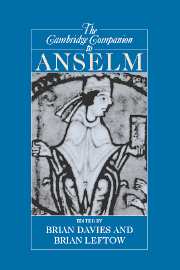Book contents
- Frontmatter
- Introduction
- 1 Anselm’s life, works, and immediate influence
- 2 Anselm on faith and reason
- 3 Anselm, Augustine, and Platonism
- 4 Anselm’s philosophy of language
- 5 Anselm on modality
- 6 Anselm’s perfect-being theology
- 7 Anselm and the ontological argument
- 8 Anselm’s account of freedom
- 9 Anselm on truth
- 10 Anselm on ethics
- 11 Anselm on the Trinity
- 12 Anselm on atonement
- Bibliography
- Index
6 - Anselm’s perfect-being theology
Published online by Cambridge University Press: 28 May 2006
- Frontmatter
- Introduction
- 1 Anselm’s life, works, and immediate influence
- 2 Anselm on faith and reason
- 3 Anselm, Augustine, and Platonism
- 4 Anselm’s philosophy of language
- 5 Anselm on modality
- 6 Anselm’s perfect-being theology
- 7 Anselm and the ontological argument
- 8 Anselm’s account of freedom
- 9 Anselm on truth
- 10 Anselm on ethics
- 11 Anselm on the Trinity
- 12 Anselm on atonement
- Bibliography
- Index
Summary
Philosophy and theology both ask what sort of being God is. One way toward an answer begins from the idea that God is in all respects perfect, and fills out the concept of God by reasoning about what a perfect being would be like. Anselm's is perhaps the name most associated with this program. The perfect-being project had a long history before Anselm. Plato, Aristotle, and such Stoics as Zeno and Cicero all offered perfect-being arguments. But Anselm probably had no access to these. It is likely that passages in Augustine and Boethius suggested the perfect-being project to him.
Anselm took up the perfect-being project in Monologion 15. Prior to this, the Monologion has argued that there is something “through which all good things are good” (Mon. 1) – something that plays the role of a property of goodness all good things share. But, Anselm suggests, whatever it is that makes all good things good must be a great good itself. (This suggestion is not backed up. Perhaps Anselm had some such thought as this in mind: delete this thing from reality, and all goodness goes with it. Perhaps an item’s goodness is in some proportion to how much less good things would be without it.) If this thing is good, it must be good through itself, as it is that through which all good things are good. So there is, Anselm thinks, a good thing whose goodness is entirely due to its own intrinsic character – not a function of its relations to anything else. Anselm asserts that this is the best of all goods, just because it is not good through anything other than itself (Mon. 1). The highest good turns out to be the efficient cause of all things other than itself (Mon. 7). So while it plays the role of a property of goodness, it is not after all a property. Properties are not causes.
- Type
- Chapter
- Information
- The Cambridge Companion to Anselm , pp. 132 - 156Publisher: Cambridge University PressPrint publication year: 2004
- 9
- Cited by



